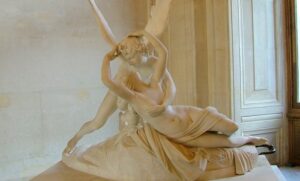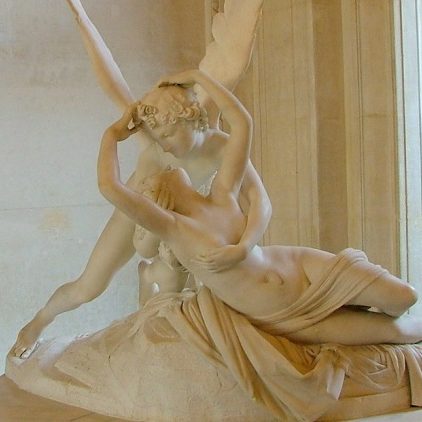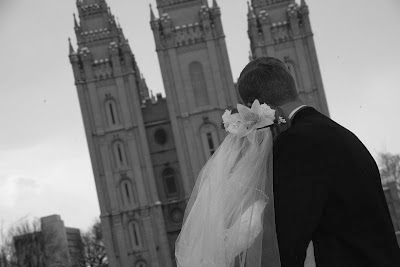
One night when Jon and I were engaged we were sitting on the couch in my apartment. He was studying out of his human anatomy book and I was working on a paper for my Women’s Literature class. In my class we had been discussing archetypes and had just read the book “She” by Robert A. Johnson. In his book Johnson examines the Greek myth of Psyche and Eros and how those archetypes teach us important lessons about marriage and women’s spiritual development.
As I was working on my paper I started to think out-loud about what I was writing about. I told Jon the story of Psyche and Eros; about how, because Psyche is the most beautiful girl in the whole world, Aphrodite becomes jealous of her and decides that she is going to be married to Death, a horrible creature who lives on top of the mountain. Psyche’s family has a huge funeral procession for her and leaves her chained at the top of the mountain. Then Aphrodite’s son Eros, the God of love, is suppose to go and kill her, but instead pricks his finger on one of his arrows and falls in love with her. He marries her and takes her to his palace to live, but he only comes to her after dark and makes her promise never to look at his face. Eventually Psyche, spurred on by the curiosity of her sisters, sneaks into Eros’ room and holds a lamp to his face. When she sees that her husband is a God she is so surprised that she spills oil on to him and burns him. When he wakes up he is enraged that she has broken her promise to him and leaves her. The rest of Psyche’s story is spent following her as she performs the impossible tasks that Aphrodite sets before her in order to win back Eros. Eventually, against all odds, she completes them and is reunited with her love. Not only that, but she is welcomed into the God’s realm as a Goddess.
After telling Jon the story, which he enjoyed, I began explaining that the argument that Johnson makes in his book is that the story of Psyche is the archetypal story for women’s spiritual growth. That all women, in order to develop their Goddess nature must have their moment of darkness on the mountain and must face the death of their maidenhood. As Johnson wrote in his book,
“In truth the maiden does die on her wedding day; an era of her life is over and she dies to many of the feminine elements she has lived thus far. Her wedding is her funeral in a sense.” (“She”, 12)
I told him how in my Women’s Literature class we discussed how a modern wedding ceremony has resemblances to a funeral. I said, ” Just think about it… the bride is dressed in white, like a ghost. The husband and other men wear black, like a sign of mourning. The bride even carries flowers and has flowers around her as decorations, reminiscent of funeral flowers. And traditionally a woman was veiled during her marriage which was a symbol of burial. It is like on her wedding day a bride has to allow the woman she once was– her maiden self– to be killed.”
I was jabbering on about all of this to Jon as he studied his anatomy text, unaware that underneath he was beginning to fume. Oblivious I went on…
” But, even though the bride is veiled, at the end of the ceremony the husband lifts her veil which is a symbol of re-birth and new life. Her maidenhood has just died and now she is being re-born. She is now on her way to discovering her true power and the true depth of her womanhood. Here let me read you this quote from Robert Johnson:
“All husbands are death to their wives in that they destroy them as maidens and force them into an evolution toward mature womanhood… A man rarely understands that marriage is death and resurrection both for a woman.” (‘She”, 16-17)
It was at this point that Jon couldn’t hold it back any longer. He silently gave me a sharp, angry look and then with furry in his pen drew a HUGE skull and cross bones right in the middle of his anatomy book. At the bottom of the page, right through the middle of the page on the anatomy of the ear, he scrolled the words MARRIAGE…. IS…. DEATH in black marker and then threw the book angrily in my lap.
“Well, if that is how you feel about getting married to me, you don’t have to! “
Needless to say, I was shocked at his reaction and promptly broke into tears. Once we both calmed down we ended up having a really good talk about marriage and the sacrifice that it was going to require from both of us. We talked about how parts of us were going to have to die and be re-born in order for our marriage to work. Our selfishness, our pride, our greed, or anger, our defenses, and our fear were going to have die in order for love, compassion, joy, selflessness, peace, and unity to be born. Like Psyche and Eros we were going to have to struggle through trials and at times allow our weakness to be un-masked, and admit that we were not perfect. We decided that that growth and unity was something — no matter how hard it was going to be– that both of us were willing to work for.
It has been nine years since that night on my couch and last week Jon and I celebrated our eighth year of marriage.
It has been an incredible journey.
As I look back at how much both of us have grown I see that in many ways our marriage does feel like a death. Many of the things we brought with us, those selfish and narrow minded parts of us, have died. Yet, I can see that our marriage has also been a birth. A birth of not only 4 new lives, but a birth of some of the most beautiful parts of ourselves– of kindness, self-sacrifice, patience, long suffering, charity, and unity. And seeing those attributes grow and bloom makes every trial and every struggle we’ve gone through together SO worth it.
This year I was so overwhelmed with gratitude that I have this wonderful man in my life. I know him better than I know anyone else in the world. He is as much a part of me as my eyes or my ears are, and there are times I think that if he was ever gone… I would die.
Yet, then I have moments when I look in his eyes and I see depth that scares me. I look at him and realize I have no idea who he is. Like Psyche holding her lamp, I realize that I have married a God–an imperfect man no doubt– but a man whose true self is so much greater than I can even comprehend. It makes me deliriously happy to think that I have eternity to figure him out.
This year, as we were talking about how far we have come together, Jon reminded me of that night on my apartment couch.
“You know, “ he said, “I sold that anatomy book back to the bookstore at the end of the semester. That means that somewhere there is someone who bought that book and then opened it to study about the anatomy of the ear and found a huge skull and cross bones with the words “MARRIAGE… IS … DEATH” written right through the middle of it. I hope that didn’t ever scare anyone away from marriage…because it really is nice.”
So, just in case you ever open up an anatomy book and see a skull and cross bones across the center fold, just know that even though marriage is death— that isn’t necessarily a bad thing.
Because out of that death, comes beautiful– BEAUTIFUL– life.










That is a really hilarious story Heather. I'm still snickering over it and the poor student who bought that book next!
But I like the idea. We truly become different people when we are married (or we SHOULD). I'll be mulling over this idea for a few days I'm sure.
You are a beautiful writer. This is an interesting perspective. I think it's true that part if us dies but them there is room for birth of greater things
Wow! Great story, Heather. And once again some amazing things for me to ponder during my day.
Ha ha. That is a great story. I bet you would know John well enough now to read his boiling fury inside. Sometimes ignorance is not bliss, eh?
I'm so glad that our old selves CAN die, that we can become new creatures in Christ. I still have lots of natural woman in me, and I don't much care for it; the selfish, impatient, hurrying side of me. I'm grateful that Christ can help me become a better person. I like myself much more now than who I was ten years ago, and I look forward to more progression and betterment, and hopefully some wisdom too.
I love all of your posts, just so you know :). I think it's a pretty good analogy. I also think, just as funerals and births aren't pain-free, neither is giving up some parts of ourselves. It's hard work, and it's easier to just stay as we are. Just like it would be easier to not have a baby. But OH what we would be missing out on, if we weren't willing to go through the sacrifices. For babies, and marriage.
Classics was one of my subjects at school, so I know that Greek myth pretty well. That is a nice spin on the story. 🙂 It's also a funny anecdote – I'm trying to picture the face of the college kid that might have bought Jon's old textbook! lol
On another note, I've tagged your blog in my Liebster Blog Award post. Just so you know. 🙂 x
I have to laugh thinking about whoever bought that book. Indeed all your insights are correct and beautifully shared. 🙂
I think some of these insights are cool. However, I disagree with a few of the connections (and I realize that was 9 years ago and you've had many cool blog insights since then that would influence how you would say it today). For example, instead of being white like a ghost, it's white for purity. You could say that also represents rebirth (as a woman vs. maiden), and then connect it to death by comparing it to how the spirit is now free from the troubles of mortality and on its way to being perfect once it's resurrected. I wouldn't say men wearing black is a sign of mourning. Not sure how I'd connect that one. Also, instead of wedding flowers being reminiscent of funeral flowers, I'd say it's the other way around. Flowers are a symbol of fertility at weddings, so they must mean something different at funerals. Perhaps fertility in the sense that they represent lives touched by the person who has passed on? Cool stuff to think about.